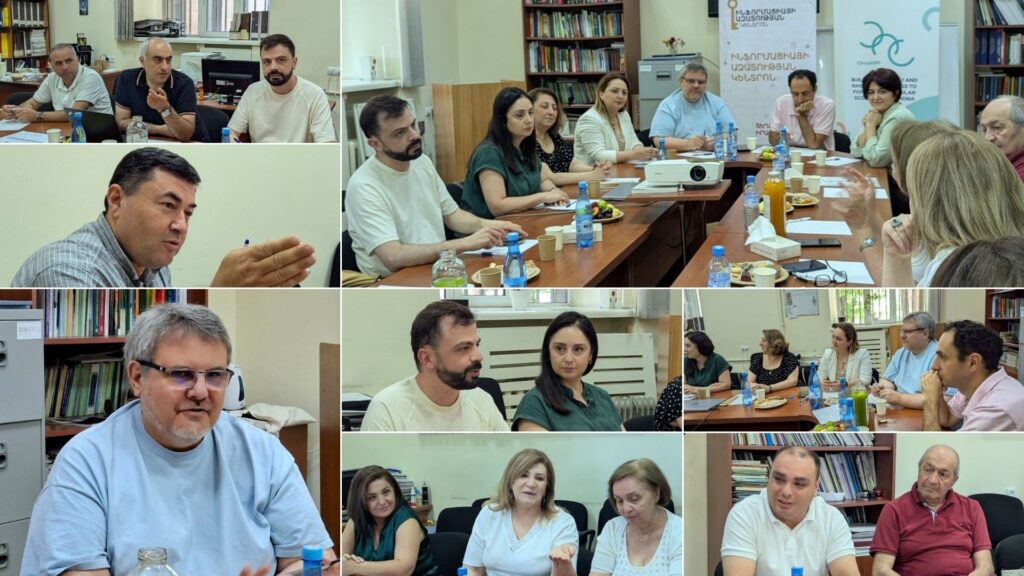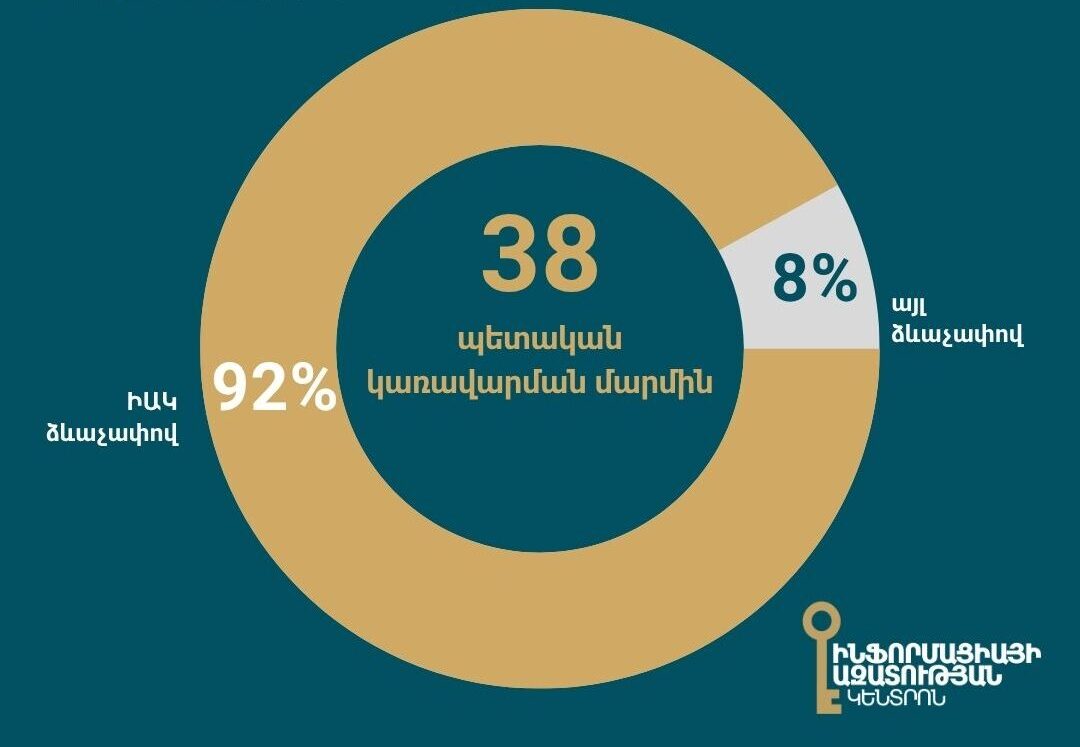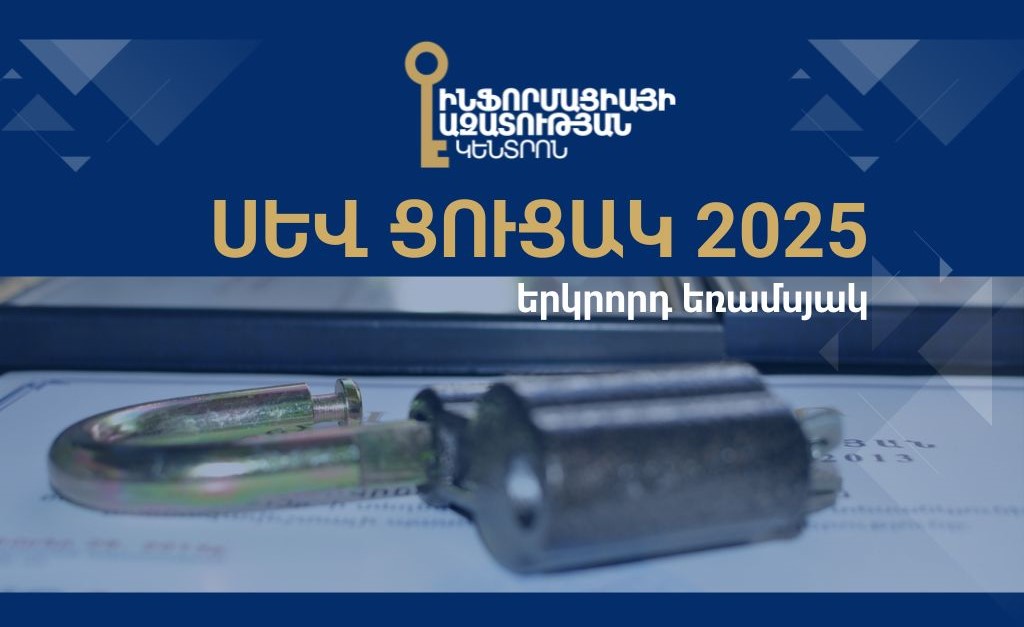The Freedom of Information Center, in collaboration with the YSU Center for Environmental Law, brought together university lecturers from across Armenia to discuss the teaching of circular economy in higher education institutions and the development of relevant educational programs.
On July 7, within the framework of FOICA’s “Pilot Program on Circular Economy,” a meeting of representatives of the educational sector was held at Yerevan State University. The goal was to discuss the development of educational programs on the topic of circular economy at universities, the opportunities for interaction between universities and the expert community, as well as to map the main needs of lecturers and educational administrators in this process.
The meeting brought together lecturers from various disciplines, representing Yerevan State University, Armenian State University of Economics, National Agrarian University of Armenia, Eurasia International University, and the International Scientific-Educational Center of the National Academy of Sciences.
Ahead of the discussion, the Freedom of Information Center had sent information requests to 18 universities across Armenia, asking them to provide details on educational programs related to the circular economy, scientific research conducted on the topic over the past three years, published articles, and both local and international collaborations in the field.
During the meeting, participants reviewed the data collected through these requests and then presented details about the thematic initiatives implemented at their universities. Then, the lecturers voiced the problems they had identified, suggesting possible solutions to them.
From the perspective of the development of sectoral education, the participants also highlighted the need for awareness raising among both students and the business community. Experts emphasized that such awareness is essential not only for engaging students and ensuring quality, practice-oriented education, but also for facilitating targeted research and scientific studies.
Narine Khalatyan, Head of the Department of Environment and Sustainable Development at the Armenian State University of Economics, noted that their department’s experience shows that student interest in this field is still relatively low: “We must not only teach the subject but also raise awareness at the stage of career orientation, showing what a promising, important and increasingly in demand sector the circular economy is.”
At the same time, participants highlighted several new initiatives launched over the past two years, which are already forming the groundwork for more systematic discussions on teaching circular economy in universities.
Participants emphasized that in many universities where educational programs related to the Sustainable Development Goals are already being implemented, the topic of circular economy has, already been integrated in one way or another, in some cases without calling it by that term. However, universities are also working in this direction. In March of this year, as part of the T-Green project -“Transforming Postgraduate Education towards Green and Sustainable Future,” implemented under the EU Erasmus+ Program and initiated by Eurasia International University-important progress was made. As a result of the project’s work, the Minister of Education, Science, Culture and Sports of the Republic of Armenia issued a decree to add a new academic program titled “Circular Economy and Governance” to the official list of master’s degree programs in higher professional education. In fact, this is the first legal act in Armenia’s education sector to officially introduce and use the term “circular economy.”
Ruben Markosyan, Vice-Rector for Educational and Methodological Affairs of Eurasia International University, noted that the above-mentioned initiative was implemented as a result of cooperation with Armenia’s EU partner institutions within the framework of the T-Green project, leading international experience in the relevant field was studied, and training was conducted.
The discussion was organized within the framework of the “CirculUP! – Building capacity and raising awareness to popularise Circular Economy in Armenia” project. As part of the project, a consultative report will also be developed to explore opportunities for integrating the topic of circular economy into various academic disciplines. This report will serve as a practical working document, outlining existing mechanisms in Armenian universities as well as possibilities for integration and further development.
“Your participation in this process is truly appreciated. Each of us brings unique experiences, needs, and problems in this field. That’s why your input is crucial for identifying effective solutions. Only through collaboration—by aligning our needs and opportunities—can we offer universities truly applicable and relevant tools,” said Areg Tadevosyan, expert of the “Pilot Program on Circular Economy.”
The opinions expressed on the teaching of the circular economy,the perspectives on its development, the problems identified, and the solutions proposed served as a platform for participants to build and strengthen new collaborative ties, which was one of the main goals of the discussion.
The initiative of the Freedom of Information Center is made possible thanks to the EU-supported grant as part of the CirculUP! The project, which is led by the Impact Hub Network, Impact Hub Yerevan, and the Environment and Health NGO, is funded by the European Union in Armenia.









